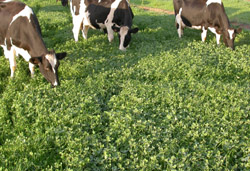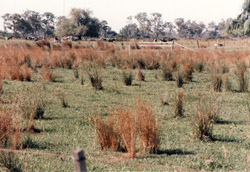2.3.6.1 - Do my pastures have good species composition?
Return to Main Menu | Return to Step 2 | Return to Step 2.3 | Return to Step 2.3.6 | Next Step
| Pasture quality (high digestibility and protein content) is important for milk production. The composition and health of your pasture is one indicator of how well you are irrigating. In northern Victoria, preferred pasture species typically include perennial ryegrass and white clover. Other species include paspalum, which can provide valuable summer feed when well managed, and modern cultivars of tall fescue. Unproductive and low quality species take up valuable space in pasture and contribute little to the herd’s diet. These species, more commonly known as “weeds”, include common couch grass, water couch (distichum), umbrella sedge, barnyard grass and rushes. Good pasture will have the following characteristics:
|
 A good, highly productive pasture |
A poor pasture will have:
The presence of weeds is often a symptom of either poor irrigation layout or irrigation management. Poor irrigation timing, irrigation layout and surface drainage may result in:
If you have a high component of weeds in your pastures, you may want to assess your irrigation and drainage practices. Talk to your dairy extension officer for further information. |
 Poor pasture - don't waste water on it |


